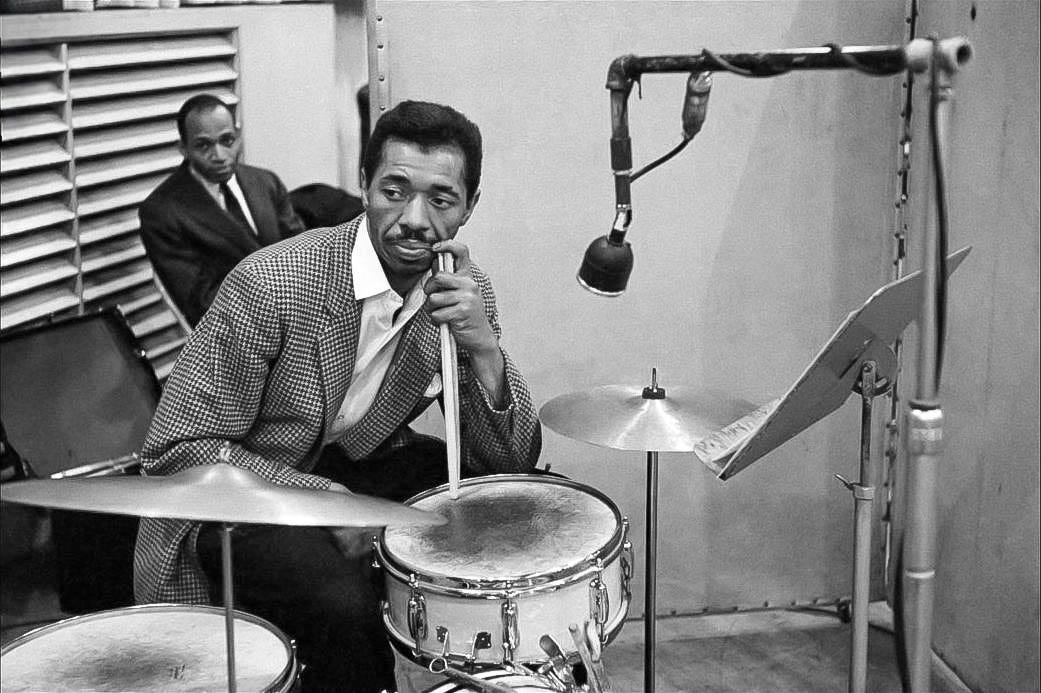To sit close by a drummer is to feel the universe calibrate its pulse. The bass drum reverberates through your chest like a heartbeat, the snare cuts through the air with surgical precision, and the hi-hats whisper secrets only the grooving know. It’s not merely playing; it’s communion—a mystical exchange of energy that defies explanation.
I’ve been fortunate, blessed even, to share these sacred spaces with rhythm keepers who elevate the ordinary to the divine. Chester Thompson, with his effortless authority; Larnell Lewis, a wizard of time and texture; Bernard Purdie, whose shuffle feels like a cosy Sunday morning. Mitch Mitchell brought fireworks to Hendrix’s canvas, while Archie Alleyne delivered Toronto’s jazz renaissance in a single brush of a cymbal. These men—and others too many to name—made me feel alive in ways that words fail to convey. Mark Kelso, Willie “Big Eyes” Smith, James Gadson, Terry Clarke, Bernard Purdy.
But there remain those I’ve only dreamed of playing beside, drummers whose grooves seem to speak in tongues. Their names echo through the corridors of music history, calling out to me like a faint melody. Let me tell you about my Mount Olympus of drummers, the rhythm gods I’ve longed to lock eyes with in the unspoken dialogue between keys and skins.
Sonny Payne
I close my eyes, and I’m onstage with the Count Basie Orchestra at Newport, 1957. Sonny is behind the kit, a hurricane dressed in a tuxedo, coaxing swing out of the big band like a magician conjuring rabbits from a hat. His ride cymbal carries me like a riptide, his crescendos lifting the room to dizzying heights. When the band hits the last note of “The Kid From Red Bank,” I imagine we’d lock eyes, grinning conspiratorially.
Buddy Rich
Buddy wasn’t just a drummer—he was a lightning storm. The man played with a ferocity that bordered on supernatural, his sticks a blur as they danced across the kit. I’d sit beside him at the piano, terrified and thrilled in equal measure, trying to keep pace with his unrelenting genius. Trading eights with Buddy would be like sparring with a heavyweight champion: brutal, exhilarating, unforgettable.
Robert "Spud" Searight
The first time I heard Snarky Puppy, I thought, Who’s the guy keeping this circus in line? Spud’s drumming is a marvel of modern rhythm—complex yet deeply rooted in funk. Sitting next to him, I’d marvel at how he carves microscopic phrases into the groove, each beat landing with both precision and soul. It’s not just music; it’s architecture.
Philly Joe Jones
Philly Joe could make a drum set and tell stories. I’d sit at the piano, entranced as his brushwork whispered secrets on the snare, his cymbals shimmering like sunlight on water. On a burning tune, his comping would egg me on, daring me to reach further, play riskier. Miles was right—Philly Joe wasn’t just good; he was the best.
Al Jackson Jr.
Al’s drumming was the heartbeat of Stax Records, the glue holding together the soul of a generation. His groove was so deep it felt like stepping into a warm embrace. I picture myself at Stax Studios, the B3 humming beside me, as Al lays down a pocket so perfect it feels like the world might just spin around his hi-hat.
Brian Blade
There’s a sacredness to Brian Blade’s playing, as if each stroke of his sticks is a prayer. Whether on a ballad or an up-tempo burner, his grooves feel like sermons, his fills like revelations. Sitting next to him would be like standing in a cathedral, the music rising like incense.J
John "J.R." Robinson
J.R.’s grooves are the DNA of pop music. “Off the Wall,” “Ain’t Nobody,” “All Night Long”—his drumming is woven into the fabric of my life. I dream of playing keys beside him, feeling the weight of his rhythms anchor the music as I reach for the stars.
Clyde Stubblefield
The “Funky Drummer” himself. Clyde didn’t just play; he invented. His grooves were the building blocks of hip-hop, yet his humility always shone through. To sit in that pocket, trading ideas with the man who defined funk, would be nothing short of a spiritual awakening.
Levon Helm
Levon’s drumming felt like a conversation—honest, earthy, and human. His beats didn’t just keep time; they told stories. I imagine playing beside him on a smoky stage in Woodstock, the music wrapping us in its warmth as Levon’s rhythms wove a tapestry of sound and soul.
Richard “Pistol” Allen
Pistol was the quiet giant of Motown, his drumming the foundation of countless hits. I’d love to sit at the keys as he drives “I Heard It Through the Grapevine,” his groove so tight it feels like the universe itself might collapse into that backbeat.
These drummers—some gone, some still gracing us with their presence—remind me why I play. They are the heartbeat of the music, the soul of the groove, the fire in the engine. To sit beside them, even in a dream, is to be part of something eternal. And in that unspoken rhythm, I find the joy that keeps me coming back, again and again, to the keys.



